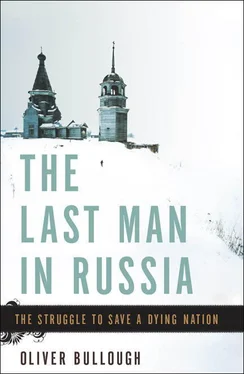Officials could demand taxes before the harvest if they wanted, and would then confiscate property when the peasant in question could not pay. When the revolution came, the peasants rose up and seized the lords’ lands, as well as that of any profitable neighbours who had made money from the few agricultural reforms imposed before World War One. The Bolsheviks, who understood nothing of the countryside, declared war on them, seizing their grain and causing famine. Somewhere between 10 and 14 million people died of hunger in the four years after 1917.
These old women were living witnesses to the history of their nation, its triumphs and its tragedies, but sadly they did not much want to talk about it.
‘Now there is freedom of religion, but there is little time. When they smashed up the church, they imprisoned the priests,’ said Galya’s aunt, slapping my foot and chuckling.
Her sister chipped in: ‘The pope of Rome will soon announce a census of religions.’
The aunt was not to be outdone. She summoned all the breath in her lungs and intoned: ‘They will come and kill us.’
Both old women burst out laughing. Galya leaned over to kiss them on their pale cheeks. They adjusted their headscarves, and we left, leaving them sitting on the sofa companionably discussing their imminent demise. The photograph I took could just as easily be from a hundred years ago. Galya looked at me, shrugged and giggled.
I tried to give up the quest at this point and go back to Bryansk to regroup, but Galya was having none of it. Although born here, she visited rarely and wanted to show the peculiar Westerner off to all her old friends. So it was that we boarded another bus, which took us beyond the end of the metalled road, to Pupkovo.
There had been no rain for weeks, and the road was pale dust with a strip of yellowing grass up the middle. I could not imagine how anyone reached Pupkovo in the thaw, when a winter’s worth of snow melted all at once, but then the thaw itself was hard to imagine in this brutal heat. Chunks of the fields on either side of the bus broke off into the air, floating on a wavering mirage.
When the bus stopped at the entrance to the village, there was desolation. A standing cross marked where the communists had knocked the church down. The church had stood until 1937, the cross said, so I wondered briefly if this was where Father Dmitry had worshipped as a boy. We strode down a slight slope into the village, where houses ringed an artificial pond. Most of the houses lacked glass in their windows; some of them lacked roofs. The place was all but abandoned and it was clear Galya was not the only person to have left Pupkovo.
‘There used to be a club there,’ said Galya, pointing at one building, which had been part of the collective farm. Now she was not smiling. ‘But there’s no one left to dance any more.’
We could hear laughter, however, and skirted the pond to a little cabin that had been built out over its surface. A shiny German car stood outside. A glistening fat man in tight shorts and nothing else waved us in, welcomed Galya by name and passed his bottle of beer into his left hand so that I could approach him and shake his right. He did not stand up or otherwise move. His was the expensive car parked on the lane. That and the large gold cross on a gold chain around his neck showed him to be a man of means. Galya explained my mission. The man turned to his two companions and to a child who was turning kebabs on the barbecue.
‘Dudko? Who the fuck was Dudko? Wasn’t he from the Kaluga region?’
The men simpered. The child stared.
‘He was from the Kaluga region. Come on, we’ll hire a forester’s truck. Get some fucking beer, and some meat and have a barbecue. It’s not fucking far through the forest,’ he said with a grin, and a lunge towards Galya.
Galya’s face was set. She declined without giving me a chance to come up with a plausible excuse. We had people to meet, she said, and took me by the hand once more.
‘Galya, why aren’t you wearing a fucking cross? Aren’t you Russian? Where are you going? Have a fucking beer.’
She towed me out of the cabin and back on to the path. Her good mood, already soured by the sight of her home village, was gone.
‘See that,’ she said. ‘Some example to his son. That was his son there, the one who said nothing. He’s got a pregnant daughter at home with no husband, and he’s sitting here drinking beer. No education. It was people like him who burned down my house, and look at him there with his cross. Oh, Russia, Russia.’
We turned left, her leading, on to a path across the fields, or what had once been fields. They butted on to the village houses but grew only rank grass.
‘Everything used to grow here,’ she said. Her voice was tight and her steps fast. ‘See there: potatoes. Over there: tomatoes. Here was beetroot. And now, nothing. It’s just ruined, like this whole country, and that man is there with his money and his beer.’
The sandy soil was exposed along the path, but otherwise this farmland had turned into wilderness. There was no human mark left.
‘No one will even harvest this hay. Why bother? There’s nothing to eat it.’
The path dipped down into some trees, where a small chapel sat in the shade. It was built of softwood planks and roofed with clear plastic. Inside was a well, made of circular concrete segments and choked with foul green slime. It was an evil-looking place to hold baptisms.
‘He built it,’ said Galya, with a jerk of her head back towards the pond. ‘He’s in the cement business.’ She paused to make sure I had understood. ‘Business,’ she repeated with invisible inverted commas around it.
A man was clearing weeds from a path that approached the far side of the well. Galya greeted him as Vasilyevich – son of Vasily – and explained my goal. He shrugged at the name Dudko. No Dudkos here, he said, but he had some papers on local history at his house if I was interested.
It was the first lead all day, and I accepted with enthusiasm. So, we walked back past the pond, the fat man, his car and his gang, whose hails Galya ignored. News of Galya’s visit spread quickly, and as we waited for Vasilyevich to bring out the papers, four or five women gathered: all of them were old friends of hers. There was no one else in the village. None of them had heard of the Dudkos. I was feeling a bit light-headed in the burning heat and began wondering whether Father Dmitry had existed at all.
The papers on the church were interesting, but Vasilyevich had no copies, so I looked through them, gave them back and turned to go. Galya and I would need to walk back to Berezino from wherever we were, so that I could find a bus back to Bryansk. There would be no further buses from here that day.
The earth track passed between further fallow fields. There was no cultivation here at all – just grass – and almost no livestock: only the occasional cow. The whole population seemed to have given up farming. We heard a car approaching from behind us. At the wheel was the man with the papers.
‘A friend of my wife came after you left,’ he said, addressing Galya instead of me. ‘She used to work for the post office. Apparently, this used to happen to letters sometimes. There are two Berezinos in the Bryansk region. The other one is over by Unecha, near the border with Belarus, spelled Berezina, with an “a”.’
It made sense. Berezino comes from the word for birch tree, and Russia has a lot of birch trees. It is a village name that could easily be repeated many times. Galya looked at me. The giggle was back.
‘Two Berezinos? And you’ve come to the wrong one,’ she said. She looked profoundly amused. The lines at the corners of her eyes were even deeper than before. She hooted with laughter and put her arm around me.
Читать дальше












